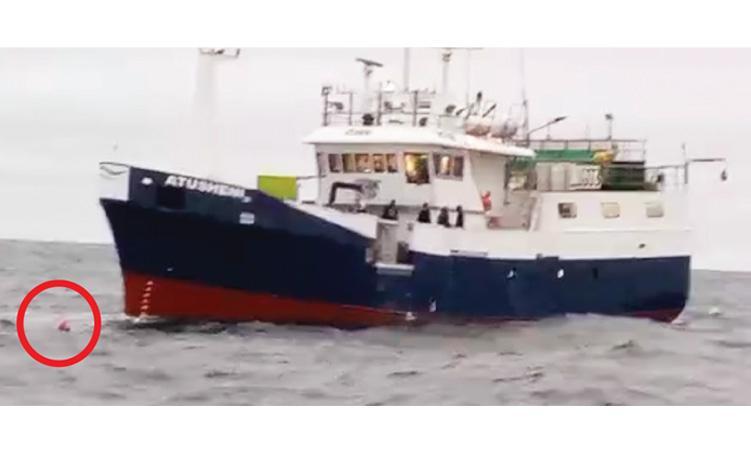Africa-Press – Namibia. A mourning fisherman was recently transferred from one vessel to another by being thrown into the sea after learning of his son’s death, according to the Merlus Fishing Group.
The incident took place aboard Atusheni, a hake and longliner vessel operated by Abroma Fishing Industries (Pty) Ltd, a subsidiary of the Merlus Group.
A video seen by The Namibian shows a crew member in an orange life jacket floating in open water between two vessels.
Merlus Fishing’s management chairperson, Stanley Katzao, has confirmed that the incident happened shortly after the vessel departed from Walvis Bay and was approaching the fishing ground.
According to Katzao, the fisherman requested to return to shore after being informed about the death of his son.
“There was another vessel of Merlus that was full, already on its way back to the harbour. By the way, this vessel that you are talking about is not obligated to have a tug board on it because it’s a small vessel,” he says.
Katzao says the transfer was done through a standard at-sea procedure that involves coordinated manoeuvres between two vessels.
“There’s nothing untoward in the sense that the person will fall into the sea because the person is completely wrapped up as he is being transferred to the other vessel. But this request to be transferred and not have the vessel turn around to go back to the harbour was made by the seaman himself,” he says.
Katzao insists that the decision was based on safety assessments and the crew member’s personal request.
“We are in the process of getting statements from both the captains and the seaman himself so that they can speak for themselves. There’s nothing wrong with the procedure or the manoeuvre that was done. If the sea is calm, the assessment of the captains are important in determining whether it’s safe to be able to do that, and it was done according to the assessment of the two,” he says.
He adds that once all statements are collected, the company will make them public.
Fishermen who spoke to The Namibian on condition of anonymity for fear of intimidation from employers have confirmed that similar incidents are often done with sick workers.
“The vessel will not turn around for any sickness unless it gets bad. The companies complain about diesel and production loss,” say the fishermen.
The fishermen went on to suggest that some deaths could have been avoided if they had proper medical personnel, or at least a nurse on board.
The fishermen also say they have a small boat to guide them and then use that to get to shore.
Former fisherman and now chairperson of the Namibia Fishermen United Association Mathew Kapeko confirms that the practice of exchanging fishermen was done in the 1990s because, at the time, many vessels did not have tug boats or rafts.
“They have done it several times in recent days but their captains would assess which would be a cheaper method. The captain would usually assess the situation and ensure there was no danger at sea. But off-coast crew members would be scared if they saw such a practice because of a lack of knowledge,” he says.
Kapeko calls for the end of this practice.
“If a vessel does not have a tug boat, it’s best they take the workers to shore or find a vessel with a tug nearby and exchange the people humanly and safely,” he says.
Namibia Food and Allied Union secretary general Jacob Penda says all employers should ensure a safe working environment.
“This is inhumane and unacceptable treatment of our employees. All the fishing vessels are supposed to have a tug board that should be used to transport fishermen from the vessel to shore.”
Penda says the union realises the seriousness of this incident and will launch an investigation into the matter, emphasising that fishermen’s lives matter and should not be taken lightly.
“Fishermen are some of the most under-protected workers in our country. They need real systems in place that make them feel safe, not only during emergencies, but when they face abuse,” says a local maritime activist.
For More News And Analysis About Namibia Follow Africa-Press






